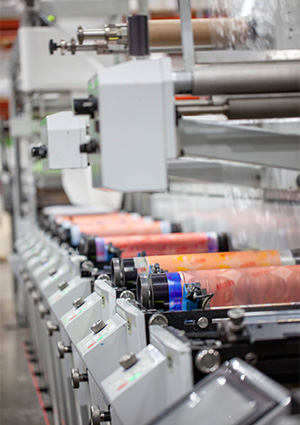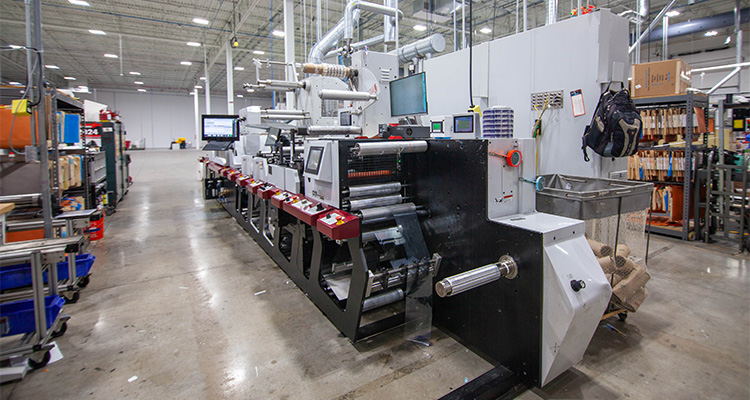The future of efficiency and workforce transformation.
As the manufacturing landscape evolves, automation is at the forefront of driving efficiency and transforming the workforce. From improving production processes to addressing labor shortages, the integration of advanced technologies reshapes how manufacturers operate. Although automation has long been a cornerstone of manufacturing, its full potential for shaping the industry continues to unfold.
At OMNI Systems, we’ve seen firsthand how strategic investments in automation produce measurable results. However, the true story of automation goes beyond equipment and technology; it’s about how manufacturers leverage these tools to enhance both processes and people.

Key trends shaping automation
Continuous manufacturing stands out as one of the most significant advancements in the industry. By streamlining production lines, this approach improves product quality, reduces waste and lowers costs. These efficiencies prove essential in a competitive landscape, enabling manufacturers to deliver value to customers while managing tight margins. Automation also plays a crucial role by handling lower-complexity tasks, allowing skilled workers to focus on higher-value roles and increasing overall productivity.
Real-time data from enterprise resource planning (ERP) systems, supported by artificial intelligence (AI), drives another transformative shift in manufacturing. These systems allow manufacturers to monitor production in real time, addressing inefficiencies as they arise rather than after the fact. AI enhances ERP systems by analyzing data, identifying patterns and providing actionable insights that allow manufacturers to anticipate challenges and optimize operations. At OMNI, for example, real-time data and AI tools have enabled us to shift from a reactive to a proactive approach, empowering operators to solve problems immediately. This shift results in long-term solutions rather than temporary fixes, ensuring processes remain efficient and resilient.
Predictive analytics further enhance this dynamic by providing insights that help manufacturers anticipate challenges and optimize operations. By harnessing AI, manufacturers can move away from simply responding to issues to preventing them altogether.
Balancing efficiency and workforce development
Automation is often viewed through the lens of efficiency, and with good reason. Automated systems reduce downtime, enhance production speed and optimize inventory management. For instance, waste management automation has transformed how manufacturers, including OMNI, handle byproducts. We’ve converted discarded materials into energy, cutting costs while supporting environmental sustainability.
However, focusing solely on efficiency overlooks a crucial aspect of automation: its ability to empower the workforce. While some worry that automation will replace jobs, the reality proves otherwise. Automation complements human labor by handling repetitive or low-value tasks, freeing employees to take on more skilled and high-value work. This creates career development opportunities for workers to upskill, aligning their capabilities with the demands of an increasingly sophisticated industry.
At OMNI, we prioritize continuous training to help our team adapt to emerging technologies. By conducting quarterly skill reviews – in addition to typical annual reviews – and offering frequent rewards for development, we encourage our employees to embrace a mindset of lifelong learning. These initiatives not only prepare our workforce for the future but also create a culture of innovation and growth.
 Labor shortages across the industry highlight the growing importance of automation. By enabling fewer workers to accomplish more, automation eases the challenge of meeting production demands. Tasks suited for automation often prove the hardest to staff consistently, with high turnover and a challenging recruitment landscape. At the same time, advancing technology raises the demand for skilled labor to manage and maintain these systems. This dynamic creates a valuable opportunity for manufacturers to invest in their people and build expertise.
Labor shortages across the industry highlight the growing importance of automation. By enabling fewer workers to accomplish more, automation eases the challenge of meeting production demands. Tasks suited for automation often prove the hardest to staff consistently, with high turnover and a challenging recruitment landscape. At the same time, advancing technology raises the demand for skilled labor to manage and maintain these systems. This dynamic creates a valuable opportunity for manufacturers to invest in their people and build expertise.
Automation: looking ahead
Automation continues to reshape the manufacturing landscape, but its adoption requires careful consideration. While automation offers advantages like waste reduction, improved efficiency and streamlined production, it’s not a one-size-fits-all solution. For some manufacturers, the upfront costs and complexity of automation may not immediately justify the investment. Success lies in assessing which aspects of automation align with a company’s unique needs and long-term goals.
However, with costs expected to decline, and systems projected to simplify, automation technologies will become more accessible for smaller manufacturers. This shift could accelerate growth across the industry as companies focus on value-driven solutions to remain competitive.
Automation transforms manufacturing by boosting efficiency, tackling labor challenges and fostering workforce development. Its true impact, however, depends on how manufacturers integrate it into their operations and culture.
At OMNI, we have learned that success comes from balancing innovation with a commitment to people. By investing in both advanced technologies and the skills of our workforce, we have been able to navigate the challenges of a rapidly changing industry while preparing for a more sustainable future. As we look to the rest of 2025 and beyond, the manufacturers who embrace this balance will be the ones to lead the way, proving that automation is not just about machines; it’s about building a smarter, stronger industry for everyone. ■
By Mike Murton
Mike Murton is President and COO of OMNI Systems. Founded in 1990 and headquartered in Mayfield Village, Ohio, OMNI Systems, is the largest privately owned US label manufacturer. Known for high-quality labels at the lowest price, OMNI partners with top global brands, offering unmatched service, innovation and on-time delivery. OMNI’s highly experienced, solutions-focused team and state-of-the-art equipment support long-term partnerships that help drive customers’ success.
